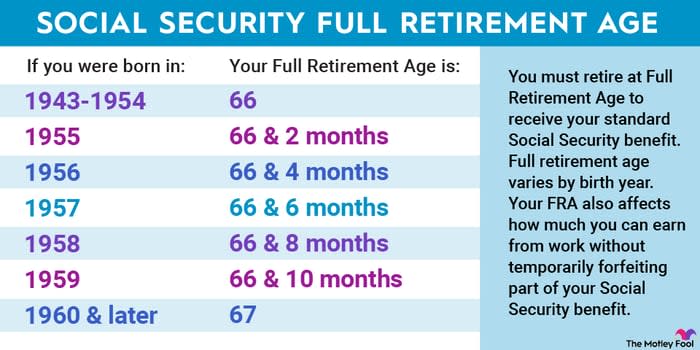3 Little-Known Social Security Rules That Can Make or Break Your Benefit Amount
Roughly 68 million Americans will receive a Social Security check in 2024, and benefits make up nearly one-third of the income of those age 65 and older.
Because most retirees will depend on Social Security to some degree, it's wise to at least understand the basics of how your benefits are calculated. While the program can be confusing, it's crucial to know the primary factors affecting how much you'll receive each month.
Whether you're nearing retirement or still have years left in your career, these three lesser-known Social Security rules can ensure you're making the most of your monthly payments.

Image source: Getty Images.
1. You have to work for at least 35 years to maximize your benefit
Three main factors will affect your benefit amount: the age you begin claiming, your career earnings, and the length of your career.
While most people are aware of the first two factors, around 65% of U.S. adults don't know that working fewer than 35 years will reduce your benefit, according to a 2024 report from the Nationwide Retirement Institute.
The Social Security Administration calculates your benefit by first taking an average of your earnings throughout the 35 years of your career that you earned the most. That number is then run through a formula and adjusted for inflation. The result is your primary insurance amount, or the benefit you're entitled to based on your work history.
Working fewer than 35 years will add zeros to your earnings average, reducing your payments. You generally only need to work for 10 years to qualify for retirement benefits, but the more years you work, the higher your benefit will be.
2. Your benefit won't go up at your full retirement age if you file early
Your primary insurance amount based on your career earnings is how much you'll receive if you file at your full retirement age (FRA). The FRA for everyone born in 1960 or later is 67 years old, meaning you'll need to wait to file until that age to receive 100% of your benefit amount.

Image source: The Motley Fool.
Claiming early will result in smaller checks each month. By filing as early as possible at 62, your benefit will be reduced by up to 30%. What many people don't realize, however, is that these reductions are permanent.
Just under half of U.S. adults mistakenly believe that if they file for Social Security early, their benefit will automatically go up once they reach their FRA, according to the Nationwide survey. While that's an understandable mistake, it could spell trouble for your retirement if you're banking on a benefit increase that's not coming.
3. You can reverse your decision within 12 months of claiming
Choosing what age to file for benefits is a big decision, as it will affect your monthly income for the rest of your life. But if you change your mind soon after claiming, you have one opportunity for a do-over.
Within 12 months of filing, you can withdraw your application and stop receiving payments. You will need to repay all the money you've already received in benefits, which includes any spousal benefits and Medicare premiums. But then you're free to file again at a later date, which will increase your benefit amount.
You also have the option to suspend benefits, which is more attainable for most people. Once you reach your FRA, you can essentially press pause on collecting payments up to age 70. When you begin taking benefits again, you'll receive an adjusted amount. It won't be as high as if you'd delayed benefits from the start, but it's more than you'd collect had you not suspended your payments.
Social Security can make retirement far more affordable, so it pays to know which factors influence your benefit amount. By understanding these lesser-known rules, you can maximize your monthly payments and enjoy a more comfortable retirement.
The $22,924 Social Security bonus most retirees completely overlook
If you're like most Americans, you're a few years (or more) behind on your retirement savings. But a handful of little-known "Social Security secrets" could help ensure a boost in your retirement income. For example: one easy trick could pay you as much as $22,924 more... each year! Once you learn how to maximize your Social Security benefits, we think you could retire confidently with the peace of mind we're all after. Simply click here to discover how to learn more about these strategies.
View the "Social Security secrets" ›
The Motley Fool has a disclosure policy.






